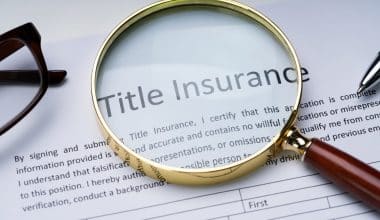A typical component of a homeowners insurance policy is personal liability coverage. While no one wants to be held liable for an accident at their home, liability coverage may help you avoid paying out of cash if the unexpected happens.
Consider what might happen if someone were to take an unlucky tumble down your stairs. If you are proven legally culpable for the accident, you may be held liable for their medical expenditures.
Learn more about what personal liability cover as a home insurance policy, as well as how to select liability coverage limits. Here are some instances of how personal liability coverage in a homeowners insurance policy might help you protect yourself.
What is Personal Liability Insurance?
Personal liability insurance provides financial security for you and your family. Your homeowners’ policy’s personal liability coverage pays for claims of physical injury and property damage caused by others for which you or covered inhabitants of your household are legally accountable.
For example, if someone falls down your stairs or your child inadvertently tosses a ball through a neighbor’s window, smashing an expensive vase, you could be held legally liable for the damages.
Many homeowners insurance policies include a minimum of $100,000 in personal liability coverage, which means the insurance company will pay up to that amount to injured people per incident. Higher limitations are available if you believe you require greater protection. You can also buy an umbrella policy to increase your liability coverage beyond the limits of your basic liability policy.
Understanding Personal Liability Insurance
Personal liability insurance is a subset of the broader coverage category known as liability insurance or “third-party insurance.” There are several types of liability insurance, but they all have one thing in common: they cover not mishaps to you, but mishaps to others that you unwittingly cause or could be held accountable for.
Personal liability insurance, as the name implies, covers an individual against liability claims originating from bodily harm or property damage caused by personal actions.
It can be obtained in three ways:
- It comes as part of your homeowners, renters, or habitation insurance policy. This coverage, sometimes known as “comprehensive personal liability,” is included in the majority of personal insurance policies.
- It is acquired as a stand-alone policy, frequently by people who do not own or rent a physical property and hence do not require homeowners insurance.
- It is added to an existing policy, which is typically a personal auto or watercraft policy.
Personal liability coverage is not confined to insured properties when included in a homeowners policy. Coverage can be extended to include situations that occur abroad. Subject to certain exclusions, the policy compensates for personal injury or property damage caused by an incidence covered by the policy. In general, the coverage includes legal expenses, court costs, and any settlements up to the amount indicated in the insurance contract.
What Does Personal Liability Insurance Cover?
Personal liability insurance covers you in a range of situations when you may be legally obligated to pay for something that happened to someone else on your property or, in some cases, on someone else’s land. Here are some examples of common personal liability claims:
- Medical expenditures incurred as a result of a visitor’s injury at your house
- Legal fees are incurred as a result of lawsuits filed to collect damages that may be covered by the policy.
- Bodily harm or property damage caused by your irresponsible acts or omissions
- Your pets may inflict bodily harm or property damage.
Payments for Medical Services
Medical payments to others are another sort of personal liability coverage that is generally included with your homeowners policy. A homeowners, renters, or condo policy often covers the payment of required medical expenditures for those who are wounded on your property by accident. This is true regardless of whether you are legally liable.
Medical payment coverage limits typically begin at $1,000 per person. Depending on the type of coverage you select, higher amounts of coverage may be available.
What Does Personal Liability Insurance Not Cover?
Below are some circumstances that personal liability insurance will not often cover, as well as suggestions for other insurance products that may. Check your homeowners’ policy for a complete list of exclusions.
#1. Car Mishaps
You run a red light and collide with an SUV. The second vehicle’s three passengers are all injured, and the SUV is totaled. Your liability automobile insurance would cover the medical and repair costs for the other vehicle’s passengers.
#2. Business Liability
You run a home-based business, and one of your clients sues you for faulty advice. Although the incident occurred in your home, personal liability insurance normally does not cover cases related to business activities. Instead, you’ll require business insurance.
#3. Injuries to members of your family
Your living-with-you daughter trips and falls down the basement stairs. Personal liability insurance might cover her injuries if she were a guest in your home, but because she’s a member of the household, she’ll have to rely on her own health insurance for treatment.
#4. Intentional injury
Your adolescent son and his buddies spray-painted derogatory remarks all over the outside of a nearby store. It is a crime, not an accident or an act of negligence, because they purposefully inflicted this damage. Your liability insurance will almost certainly not cover your son’s defense.
How Much Personal Liability Coverage Do You Require?
Homeowners’ insurance policies often have liability limits ranging from $100,000 to $500,000. If that isn’t enough, companies that cater to affluent customers, such as Chubb, sell sums in the millions.
The amount of personal liability insurance you purchase is determined by the value of your assets, the likelihood of being sued, and your risk tolerance.
Consider purchasing adequate personal liability insurance to cover your whole portfolio, including your home, savings, and investments. If any of the following lawsuit risk factors apply to you, you may want to choose a higher amount:
- You enjoy activities that could endanger others, such as skiing, hunting, or surfing.
- On your land, you have a swimming pool, trampoline, or other “attractive nuisance.”
- You have a dog. (Confirm that your insurer will cover the breed.)
- You are a celebrity or a wealthy member of the community.
- You frequently have parties at your house.
Is Homeowners’ Personal Liability Insurance Required?
There is usually no regulation requiring you to have personal liability insurance in order to own a home. If you have a mortgage, you will almost probably need personal liability coverage.
Most mortgage lenders need hazard insurance, which is a component of a homeowners policy that covers your home’s construction. When you purchase homeowners insurance for hazard coverage, you will almost certainly receive personal liability coverage as well.
You may choose not to obtain homeowners insurance if you have paid off your mortgage or are purchasing a property without a mortgage. However, leaving without financial protection from litigation or the destruction of your home is a risk you should carefully consider.
How Much Personal Liability Coverage Do You Need?
The more your financial holdings, the more liability coverage you should have. To reduce the danger of financial loss if you are sued, your liability coverage maximum should be as high as you can afford.
For example, if your net worth is $600,000 and you are sued for $400,000 in damages but only have $100,000 in coverage, the plaintiff can seize your assets to cover the remaining $300,000 in damages. Plaintiffs are more likely to pursue you if you have a big net worth since you can pay out a judgment more easily.
| Category | Amount |
| Personal Liability Coverage | $100,000 |
| Personal Injury or Property Damage Claim Brought Against You | ($400,000) |
| Recoverable From Personal Assets | $300,000 |
If you have $100,000 or more in assets, you should consider getting an umbrella policy or personal excess liability insurance. Both act as extra coverage with a larger maximum.
In other words, an umbrella policy and personal excess liability insurance kick in when your homeowners’ coverage limitations have been exhausted. An umbrella policy extends coverage, whereas personal excess liability insurance supplements the underlying policy.
An umbrella policy or personal excess liability insurance would kick in for the remaining $300,000 in the situation above, protecting your assets. Keep in mind that your policy’s coverage limits will vary.
How Much Does Personal Liability Home Insurance Cost?
A greater limit for personal liability coverage is quite affordable to obtain. This is especially true when compared to other homeowners insurance changes, such as boosting residence coverage. The table below shows the cost of expanding your personal liability coverage limits on a $200,000 State Farm policy.
| Personal Liability Coverage | Annual Homeowners Insurance Rate | Cost of Increased Coverage |
| $100,000 | $4,339 | – |
| $300,000 | $4,354 | $15 |
| $500,000 | $4,364 | $10 |
| $1,000,000 | $4,374 | $10 |
According to our calculations, tripling your personal liability coverage costs only $15 more each year. Remember that the exact cost will vary depending on your home’s location, among other things. However, increasing your personal liability coverage limits should not result in a significant increase in premiums.
Despite the fact that umbrella policies give significantly higher coverage limits, the cost of personal umbrella liability policies remains inexpensive. A personal umbrella liability policy with $1 million of coverage will cost you between $150 and $300 per year. Remember that a personal umbrella policy provides extra coverage, which means it kicks in after your homeowners or vehicle insurance policies have been exhausted.
What is the Distinction Between Personal Liability and Personal Injury Coverage?
Personal liability insurance covers you if you cause bodily harm or property damage to another person. Personal injury coverage, despite its name, does not cover bodily harm. Instead, it can aid in your defense if you are sued for slander, libel, or invasion of privacy. Although most homeowners plans include personal liability coverage, you may not have personal injury coverage unless you add it as an endorsement.
Is Personal Liability Insurance Subject to a Deductible?
A deductible is the amount of money you must pay if you file a homeowner’s property damage claim. However, deductibles are not usually required for liability claims.
Is Personal Liability Insurance a Good Idea?
If you are ever found legally responsible for the injury or property damage of another person, having personal liability insurance is the only way to preserve your ability to provide for yourself financially in the event that this occurs. If you own a home in addition to other valuable assets, you should make sure that the amount of personal liability coverage you have is sufficient to cover the total worth of those assets.
Does Everyone Have Personal Liability Insurance?
Personal liability insurance is typically included in insurance policies purchased by homeowners as well as renters, and it is sometimes referred to as “coverage E.” Coverage will be provided in the event that you are determined to be accountable for the property damage or physical injury of others.
Does Homeowners Insurance Cover Personal Injury?
Personal injuries are covered by homeowner’s insurance as long as the policy in question includes personal liability coverage, which is standard for most plans. However, your personal liability insurance will not cover every injury that occurs as a result of your actions. Only injuries that are a direct result of your own carelessness will be covered under this policy. Because of this, your personal liability insurance will not cover any activities that were done on purpose. In addition, the personal liability insurance you have will only cover damages you cause to other people, but your health insurance will pay for any injuries you sustain to yourself.
What Insurance Is Better Than Liability?
When considering the price difference between liability insurance and full coverage, keep in mind that you are getting a significant amount of additional coverage with the full coverage option. If you were to cause an accident, even though you will have some coverage with basic liability insurance, it is possible that this coverage will not be enough to protect you.
Do Most People Have Liability Insurance?
Since having auto liability insurance is required in the majority of states in the United States, the majority of people who hold a driver’s license are familiar with it. This insurance offers monetary protection to a motorist in the event that they cause injury to another person or damage to the property of another person while operating a motor vehicle.
Personal Liability Insurance FAQs
What does the liability insurance cover?
Liability insurance especially covers property and personal damages.
What does it mean to have liability insurance only?
Simply defined, liability-only automobile insurance is a policy that only covers losses you cause, not those you sustain.
- BEST UMBRELLA INSURANCE: 2023 Best Umbrella Insurance Options
- PERSONAL LIABILITY COVERAGE: Definition, Cover & How Much You Need
- NEW HOMEOWNERS TAX CREDIT: What It Is And The Eligibility
- BUSINESS INSURANCE: Definition, Types, Example, Cost & How it Works
- SMALL BUSINESS INSURANCE: Overview, Liability, Requirements, Costs
- Car Liability Insurance: The Cheapest Coverage Car Insurance (Updated!)
- RENTERS’ LIABILITY INSURANCE: Coverages, Policies & Costs






